

Ludwig Wittgenstein. G. E. Moore. Life and work[edit] Moore was born in South London on 4 November 1873.[2] His eldest brother was Thomas Sturge Moore, a poet, writer and engraver.[3] In 1892, he was educated at Dulwich College[4] and then attended Trinity College Cambridge to study classics for moral sciences.[5] He became a Fellow of Trinity in 1898, and went on to hold the University of Cambridge chair of mental philosophy and logic, from 1925 to 1939.
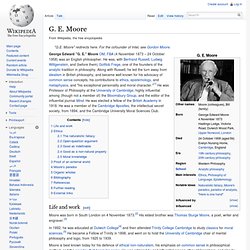
Moore is best known today for his defence of ethical non-naturalism, his emphasis on common sense in philosophical method, and the paradox that bears his name. Bertrand Russell. Russell led the British "revolt against idealism" in the early 20th century.[58] He is considered one of the founders of analytic philosophy along with his predecessor Gottlob Frege, colleague G.
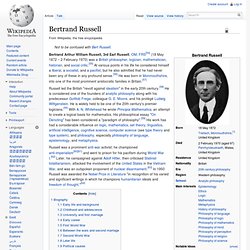
E. Moore, and his protégé Ludwig Wittgenstein. He is widely held to be one of the 20th century's premier logicians.[55] With A. N. Analytic philosophy. Analytic philosophy (sometimes analytical philosophy) is a style of philosophy that came to dominate English-speaking countries in the 20th century.
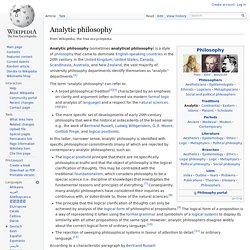
In the United Kingdom, United States, Canada, Scandinavia, Australia, and New Zealand, the vast majority of university philosophy departments identify themselves as "analytic" departments.[1] The term "analytic philosophy" can refer to: A broad philosophical tradition[2][3] characterized by an emphasis on clarity and argument (often achieved via modern formal logic and analysis of language) and a respect for the natural sciences.[4][5][6]The more specific set of developments of early 20th-century philosophy that were the historical antecedents of the broad sense: e.g., the work of Bertrand Russell, Ludwig Wittgenstein, G. E. José Guilherme Merquior. José Guilherme Merquior (April 22, 1941 – January 7, 1991) was a Brazilian diplomat, academic, writer, literary critic and philosopher.
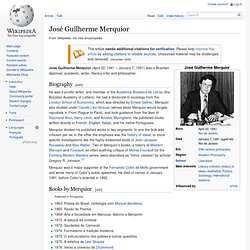
Biography[edit] He was a prolific writer, and member of the Academia Brasileira de Letras (the Brazilian Academy of Letters). He had a doctorate in sociology from the London School of Economics, which was directed by Ernest Gellner. Merquior also studied under Claude Lévi-Strauss (whose ideas Merquior would largely repudiate in From Prague to Paris), and took guidance from the likes of Raymond Aron, Harry Levin, and Arnaldo Momigliano. Henri Bergson. He was awarded the 1927 Nobel Prize in Literature "in recognition of his rich and vitalizing ideas and the brilliant skill with which they have been presented".[2] In 1930, France awarded him its highest honour, the Grand-Croix de la Legion d'honneur.
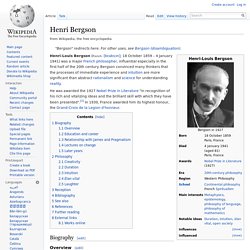
Biography[edit] Overview[edit] Bergson was born in the Rue Lamartine in Paris, not far from the Palais Garnier (the old Paris opera house) in 1859. Gottlob Frege. Friedrich Heinrich Jacobi. Karl Leonhard Reinhold. Karl Leonhard Reinhold (26 October 1757 – 10 April 1823) was an Austrian philosopher.
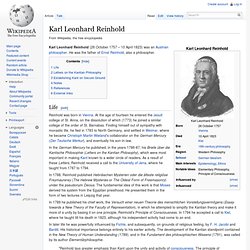
He was the father of Ernst Reinhold, also a philosopher. Life[edit] Reinhold was born in Vienna. At the age of fourteen he entered the Jesuit college of St. Western philosophy. Heraclitus. Heraclitus of Ephesus (/ˌhɛrəˈklaɪtəs/;[1] Greek: Ἡράκλειτος ὁ Ἐφέσιος, Hērákleitos ho Ephésios; c. 535 – c. 475 BCE) was a pre-Socratic Greek philosopher, a native of the Greek city Ephesus, Ionia, on the coast of Asia Minor.
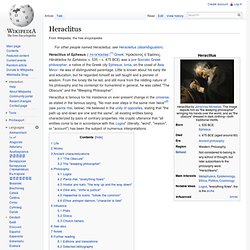
Parmenides. Parmenides of Elea (/pɑrˈmɛnɨdiːz əv ˈɛliə/; Ancient Greek: Παρμενίδης ὁ Ἐλεάτης; fl. 5th century BCE) was an ancient Greek philosopher born in Elea, a Greek city on the southern coast of Magna Graecia.

Edmund Husserl. Gottlob Ernst Schulze. In Göttingen, he advised his student Arthur Schopenhauer to concentrate on the philosophies of Plato and Kant.
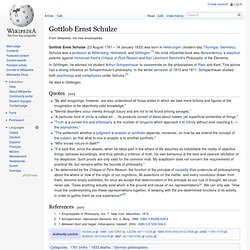
This advice had a strong influence on Schopenhauer's philosophy. Schelling. Martin Heidegger. Martin Heidegger (German: [ˈmaɐ̯tiːn ˈhaɪdɛɡɐ]; 26 September 1889 – 26 May 1976) was a German philosopher, widely seen as a seminal thinker in the Continental tradition, particularly within the fields of existential phenomenology and philosophical hermeneutics.

From his beginnings as a Catholic academic, he developed a groundbreaking and widely influential philosophy. His relationship with Nazism has been a controversial and widely debated subject. For Heidegger, the things in lived experience always have more to them than what we can see; accordingly, the true nature of being is “withdrawal”. The interplay between the obscured reality of things and their appearance in what he calls the “clearing” is Heidegger's main theme. Johann Gottlieb Fichte. Johann Gottlieb Fichte (German: [ˈjoːhan ˈɡɔtliːp ˈfɪçtə]; May 19, 1762 – January 27, 1814) was a German philosopher. He was one of the founding figures of the philosophical movement known as German idealism, which developed from the theoretical and ethical writings of Immanuel Kant. Fichte is often perceived as a figure whose philosophy forms a bridge between the ideas of Kant and those of the German Idealist Georg Wilhelm Friedrich Hegel.
Recently, philosophers and scholars have begun to appreciate Fichte as an important philosopher in his own right due to his original insights into the nature of self-consciousness or self-awareness. Jacques Derrida. Jacques Derrida (/ʒɑːk ˈdɛrɨdə/; French: [ʒak dɛʁida]; born Jackie Élie Derrida;[1] July 15, 1930 – October 9, 2004) was a French philosopher, born in French Algeria. Derrida is best known for developing a form of semiotic analysis known as deconstruction.
He is one of the major figures associated with post-structuralism and postmodern philosophy.[3][4][5] During his career Derrida published more than 40 books, together with hundreds of essays and public presentations. Karl Marx. Michael E. Rosen. Michael E. Immanuel Kant.
Friedrich Nietzsche. Simon Glendinning. Simon Glendinning is an English philosopher currently teaching in the European Institute at the London School of Economics. He is Director of the Forum for European Philosophy. Glendinning's work is characterised by the way in which it engages with thinkers and themes from both the 'analytic' and 'continental' traditions in philosophy. Babette Babich. Babette E. Søren Kierkegaard. Søren Aabye Kierkegaard (/ˈsɔrən ˈkɪərkəɡɑrd/ or /ˈkɪərkəɡɔr/; Danish: [ˈsɶːɐn ˈkiɐ̯ɡəɡɒːˀ] ( Friedrich Engels. Socrates. Plato. Plato (/ˈpleɪtoʊ/; Greek: Πλάτων Plátōn "broad"pronounced [plá.tɔːn] in Classical Attic; 428/427 or 424/423 – 348/347 BCE) was a philosopher, as well as mathematician, in Classical Greece.
He is considered an essential figure in the development of philosophy, especially the Western tradition, and he founded the Academy in Athens, the first institution of higher learning in the Western world. Aristotle. Aristophanes. Stoicism. Logic. Ethics.
Archytas. Sovereignty. Thomas Hobbes. Georg Wilhelm Friedrich Hegel. Jean-Jacques Rousseau. Isaac Newton. Marxism. Adam Smith. David Hume. John Locke.